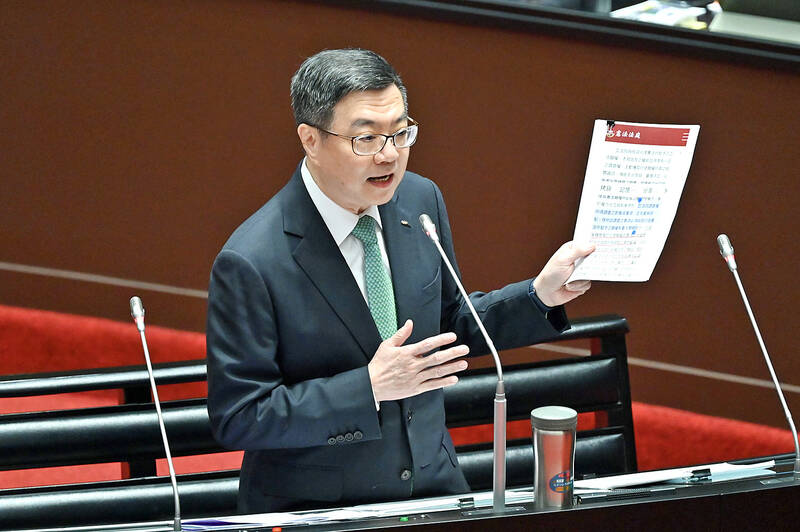The government could seek a constitutional interpretation if lawmakers vote down its motion to reconsider legislative reform bills today, Premier Cho Jung-tai (卓榮泰) said yesterday.
Cho made the comments during a session at the Legislative Yuan on the eve of today’s floor vote on the motion, which is expected to be rejected by the opposition parties’ combined majority.
The legislature is urged to give serious thought to discussing the merits of the bills and ensure their consistency with other legislation and its acceptability among Taiwanese, he said.

Premier Cho Jung-tai speaks to lawmakers at the legislature in Taipei yesterday.
Photo: George Tsorng, Taipei Times
The bills would amend the Act Governing the Legislative Yuan’s Power (立法院職權行使法) and the Criminal Code, authorizing lawmakers to call private citizens and officials to testify at investigative hearings or face fines and — in the case of officials — jail time.
The government does not rule out seeking a constitutional remedy to overturn the laws should the Legislative Yuan insist on passing them, Cho said, adding that officials would make the move after consulting lawyers and academics.
The remedies include asking the Constitutional Court to rule on the legislation and calling for a temporary injunction to suspend promulgation until judges settle the matter, he said.
Minister of Justice Cheng Ming-chien (鄭銘謙) said the bills are an overreach, as the legislature’s ability to conduct investigations is a subsidiary power and must abide by Constitutional Interpretation No. 585.
The interpretation stipulates that the Legislative Yuan may not extend its investigative power to a matter “related to the independent exercise of powers by an organ of the state ... guaranteed by the Constitution.”
“An executive chief, by the authority inherent in his or her executive powers, is entitled to decide not to make public any information that may affect or interfere with the effective operation of the executive branch,” it says.
The bills broaden the legislature’s power beyond its constitutional scope and empower lawmakers to arbitrarily impose penalties on private citizens for refusing to comply with their demands to testify, Cheng said.
The ministry deems the proposed laws to be “profoundly inappropriate” and believes their promulgation would lead to “social upheaval,” he said.
Democratic Progressive Party (DPP) Legislator Huang Jie (黃捷) said the bills would enable lawmakers to impose penalties on officials for the crime of “counter interpellation,” a word that does not exist in legislative rules or law books.
Chinese Nationalist Party (KMT) lawmakers gave the phrase varying and mutually exclusive definitions, including providing an irrelevant answer, responding to a question with a question and being mean, she said during the session.
DPP Legislator Chuang Ruei-hsiung (莊瑞雄) said that the bills’ provisions authorizing fines of up to NT$100,000 for people who refuse to testify dwarfs the punishment for not appearing before a court after being served with a subpoena, which carries at most a NT$30,000 fine.
KMT Legislator Wang Yu-min (王育敏) said that the government had given “conflicting” statements, as Cho had previously voiced support for legislative reforms.
Cho’s comments suggesting that the amendments lacked restrictions were incorrect, as hearings could only be held on “important matters concerning the public,” Wang said.
The amendments merely sought to address the long-standing problem of insufficient oversight of the executive branch, she added.
Additional reporting by Chen Cheng-yu
Source: Taipei Times - 2024/06/21




















